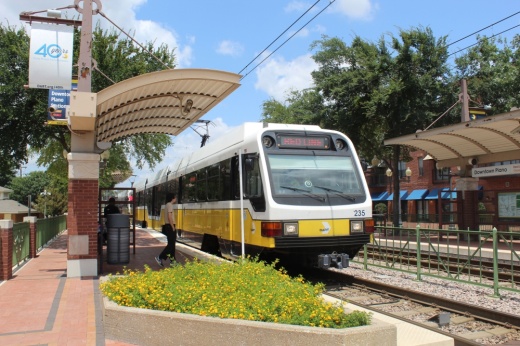Officials have cited a need for greater financial transparency from the transit agency and requested DART work to recruit other cities. Plano Mayor John Muns said the city does not intend to leave DART.
Despite action by the cities, only DART’s board of directors can vote to reduce the sales tax contribution without legislative intervention. A vote is not currently being considered, DART’s Chief Communications Officer Jeamy Molina said.“No one city can unilaterally decide to reduce the sales tax,” Molina said.
The setup
Plano has been a member of DART since the transit agency was founded in 1983. The agency hasn’t added any new member cities while inflation and increasing populations across North Texas have driven a rise in sales tax contributions.
“We really believe a quarter-cent reduction over time would not affect [DART’s] ability to continue to provide the services they are doing,” Muns said.
Muns also said the agency should consider creating hybrid membership models for other North Texas cities to participate in.
Joining the agency becomes a challenge for other communities because they’ve elected to direct their sales tax to something else, Plano City Manager Mark Israelson said.
“We’ve had the 1% going to DART,” he said. “The other communities have used that for economic development, community development and other things.”
DART’s largest source of revenue comes from sales tax contributions from its member cities. The agency is forecast to collect about $24.9 billion in sales tax revenue over the next 20 years.
For comparison, the agency expects to spend $35.1 billion over the next 20 years on a combination of operating expenses and debt service payments, according to its fiscal year 2023-24 budget.
A quarter-cent reduction would cut expected revenue by about $6 billion, Molina said. That would cause service reductions across the DART system, she said.
“We would be looking at service reductions across the entire system,” she said. “For a train, for a bus route, you’d have to be sitting outside waiting for possibly 30 minutes, if not more.”
As DART officials have met with member cities, they’ve learned that each city has expressed different concerns, Molina said.
“We know that there’s a huge burden on all of our cities,” she said. “But this would be such a huge impact to the communities that we service.”
Zooming in
Written into the Plano resolution is a proposed phase-in process that would reduce the sales tax contribution over time, Plano’s Government Relations Director Andrew Fortune said. The resolution proposes capping DART’s annual sales tax collection at about $870.8 million, the agency’s projected collection total during FY 2023-24, and phasing in a reduction over time, according to the resolution.
A quarter-cent reduction would enable the city to redirect about $30 million per year annually to something else, such as infrastructure improvements or economic development, Fortune said.
“It’s not a reduction—it’s a redirection,” Israelson said. “It would still require the city going back to the citizens to ask, ‘Where would you like to apply these dollars?’”
Cities would have to call its own election, and voters can elect to redirect the contribution or continue sending the 1% sales tax contribution to DART.
“[The board] would tell the comptroller to reduce our sales tax by whatever percentage they decide and then the cities themselves would have to go to an election,” Molina said.
What’s next
The DART board administration committee met July 8 shortly after Plano City Council members took action. Multiple committee members expressed a need for the agency to work with its member cities.
“We need to work with the cities and with those communities to do what we need to do,” board of directors Chair Gary Slagel said during the meeting. “We need to define programs, not reductions.”
For the past year, DART officials have met with each member city to develop what they call an area plan, Molina said. Those plans aim to address how DART can be a more valuable asset to its member cities.
Officials are in the process of developing plans for each city that aim to address each city’s issues long-term, she said.
“We know how important our service area member cities are to DART and making sure they’re a part of the process is the only way that we’re going to continue to move forward,” Molina said.





